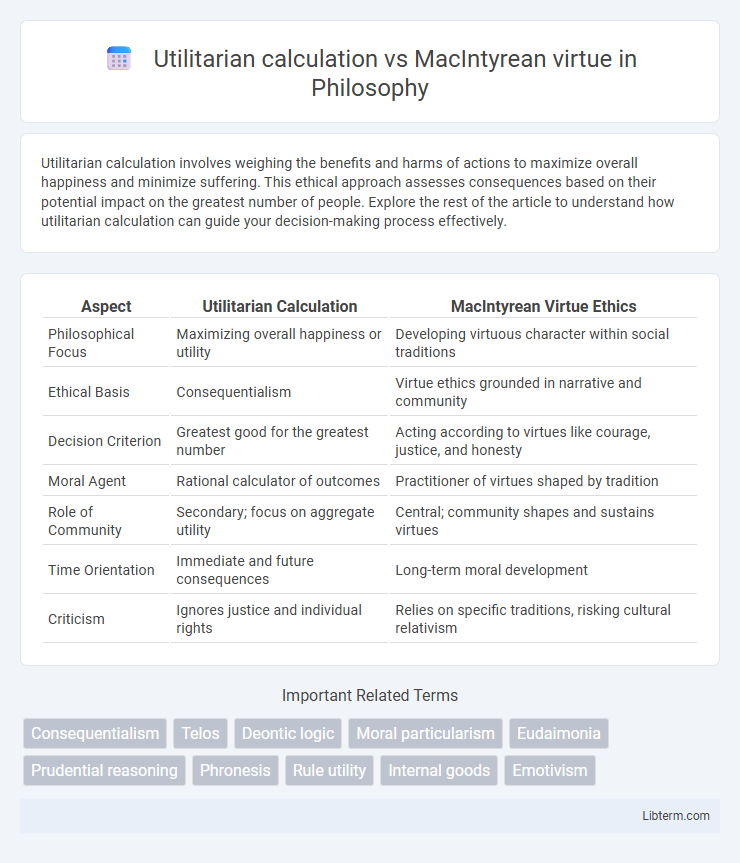Utilitarian calculation involves weighing the benefits and harms of actions to maximize overall happiness and minimize suffering. This ethical approach assesses consequences based on their potential impact on the greatest number of people. Explore the rest of the article to understand how utilitarian calculation can guide your decision-making process effectively.
Table of Comparison
| Aspect | Utilitarian Calculation | MacIntyrean Virtue Ethics |
|---|---|---|
| Philosophical Focus | Maximizing overall happiness or utility | Developing virtuous character within social traditions |
| Ethical Basis | Consequentialism | Virtue ethics grounded in narrative and community |
| Decision Criterion | Greatest good for the greatest number | Acting according to virtues like courage, justice, and honesty |
| Moral Agent | Rational calculator of outcomes | Practitioner of virtues shaped by tradition |
| Role of Community | Secondary; focus on aggregate utility | Central; community shapes and sustains virtues |
| Time Orientation | Immediate and future consequences | Long-term moral development |
| Criticism | Ignores justice and individual rights | Relies on specific traditions, risking cultural relativism |
Introduction to Moral Frameworks
Utilitarian calculation evaluates moral decisions based on the greatest overall happiness or utility generated, emphasizing outcomes and quantifiable benefits. MacIntyrean virtue ethics centers on character development and communal practices, advocating for virtues that align with human flourishing within a social context. These contrasting moral frameworks offer distinct approaches: one prioritizes consequentialist metrics, while the other emphasizes narrative identity and moral traditions.
Defining Utilitarian Calculation
Utilitarian calculation assesses actions based on their outcomes, quantifying pleasure or pain to maximize overall happiness. This approach relies on measurable consequences for decision-making, emphasizing efficiency and aggregate welfare. Unlike MacIntyrean virtue ethics, which centers on character and moral tradition, utilitarian calculation focuses on the utility generated by each choice.
Core Principles of MacIntyrean Virtue Ethics
MacIntyrean virtue ethics centers on the development of moral character through practical wisdom (phronesis), emphasizing virtues like honesty, courage, and justice as integral to human flourishing within a community. Unlike utilitarian calculation, which maximizes overall happiness through cost-benefit analysis, MacIntyrean ethics rejects abstract principles in favor of narrative context and traditions that shape moral understanding. The core principles include the cultivation of virtues, the role of social practices in ethical development, and the teleological aim of achieving a good and meaningful life through sustained moral effort.
Comparing Ethical Foundations
Utilitarian calculation centers on maximizing overall happiness by measuring actions through their consequences, emphasizing outcome-based ethics rooted in classical utilitarianism by Jeremy Bentham and John Stuart Mill. MacIntyrean virtue ethics, inspired by Alasdair MacIntyre, prioritizes character development and community practices that cultivate virtues aligned with human flourishing over mere consequence evaluation. Comparing these foundations highlights utilitarianism's quantitative focus on aggregate well-being while MacIntyrean ethics stresses qualitative aspects of moral traditions and narrative identity in ethical decision-making.
Practical Decision-Making: Utility vs. Virtue
Utilitarian calculation emphasizes practical decision-making based on maximizing overall utility by weighing costs and benefits to achieve the greatest good for the greatest number. MacIntyrean virtue focuses on cultivating moral character and practical wisdom, guiding decisions through internalized virtues that shape long-term human flourishing. The tension between utility and virtue reveals contrasting approaches: one prioritizes outcomes via quantitative measures, while the other centers on qualitative character development for ethical action.
Critiques of Utilitarian Approaches
Utilitarian calculation often faces criticism for reducing moral decision-making to quantifiable outcomes, neglecting the rich complexity of human virtues emphasized in MacIntyrean ethics. Critics argue that utilitarianism's focus on maximizing overall happiness can overlook individual character development and the communal context essential to virtuous living. This ethical framework is challenged for ignoring the moral significance of intentions and the cultivation of practical wisdom central to MacIntyre's virtue ethics.
Strengths of Virtue-Based Ethics
Virtue-based ethics, grounded in MacIntyrean philosophy, emphasizes character development and moral integrity over quantifiable outcomes, fostering holistic personal growth and communal well-being. Unlike utilitarian calculation that prioritizes maximizing utility, virtue ethics cultivates enduring habits and virtues, promoting moral resilience and practical wisdom in complex situations. This approach strengthens ethical decision-making by embedding values within individual identity, encouraging consistent virtuous behavior beyond immediate consequences.
Real-World Scenarios: Contrasting Outcomes
Utilitarian calculation prioritizes outcomes by maximizing overall happiness, often leading to decisions that favor collective benefit even if individual rights are compromised. MacIntyrean virtue ethics emphasizes character development and moral virtues, guiding individuals to act in ways that foster community well-being and personal integrity. In real-world scenarios like healthcare allocation, utilitarian approaches might prioritize treatment based on survival probability, whereas MacIntyrean virtue ethics would focus on compassionate care that respects patient dignity and community values.
Bridging the Divide: Towards Integrated Ethics
Utilitarian calculation emphasizes maximizing overall happiness through cost-benefit analysis, while MacIntyrean virtue ethics prioritizes character development and moral traditions rooted in communal practices. Bridging the divide involves integrating quantitative outcomes with qualitative virtues to create a more comprehensive ethical framework. This synthesis enables decision-making that respects individual well-being and cultivates moral character within social contexts.
Conclusion: Relevance in Contemporary Ethics
Utilitarian calculation emphasizes maximizing overall happiness through measurable outcomes, offering clear decision-making criteria in contemporary ethics. MacIntyrean virtue ethics prioritizes character development and moral traditions, addressing the complexity of human flourishing beyond mere utility. Balancing these approaches enriches ethical deliberation by integrating outcome-based analysis with deep virtues, essential for resolving modern moral dilemmas.
Utilitarian calculation Infographic

 libterm.com
libterm.com